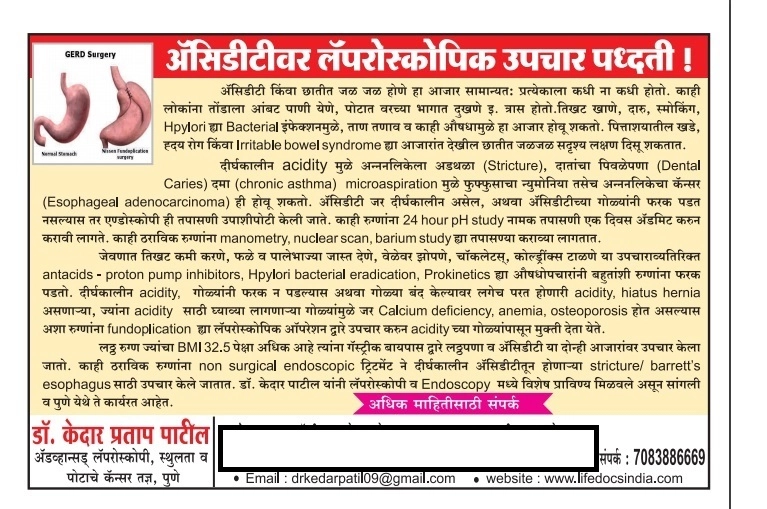
Presize Clinic
Call : +91- 8888655455
Mail : presizeclinic@gmail.com
Address : Office No 303, Shivai 1, Sinhagad Road, Parvati Paytha, Landmark Nearby Sarasbaug and Dandekar Pul. Pune 411028, Maharashtra, India.
1000 +
Surgeries Done
Safe and Effective GERD Treatment in Pune - For Acid Reflux Problems
What is GERD or Acidity?
Ever felt a sour or bitter taste rising in your throat, like a mix of acidic burn and partially digested food after a heavy meal? It is medically termed as GERD.
Gastroesophageal Reflux Disease (GERD) is a long-term digestive condition where stomach acid repeatedly backs up into the esophagus, leading to irritation and discomfort.
The lower esophageal sphincter (LES), is a muscle that normally prevents acid from rising, when it becomes weak or fails to function properly, acidity occurs. GERD is commonly referred to as acidity.
Common Symptoms of GERD
GERD presents with various symptoms, which can range from mild to severe, including:
- Heartburn – A burning sensation in the chest, often after eating or at night.
- Acid reflux – A sour or bitter taste in the mouth due to stomach acid regurgitation.
- Regurgitation – Feeling of food or liquid coming back up into the throat or mouth.
- Chronic cough – Persistent cough, especially at night or after meals.
- Difficulty swallowing (Dysphagia) – A sensation of food getting stuck in the throat.
- Hoarseness or sore throat – Acid irritation affecting the vocal cords.
Why Early Diagnosis and Treatment is Important
If GERD is not treated, it can result in complications like inflammation of the esophagus (esophagitis), the formation of ulcers, narrowing of the esophagus (strictures), or even Barrett’s esophagus, a condition that may increase the risk of cancer. Timely diagnosis and appropriate treatment are essential to control symptoms and protect the esophagus from long-term damage.
For expert GERD treatment in Pune, consulting an experienced GERD specialist like Dr. Kedar Patil ensures accurate diagnosis and tailored treatment plans to relieve discomfort and improve digestive health.
Lifestyle Changes for GERD Management
Simple lifestyle changes can go a long way in reducing GERD symptoms and keeping acid reflux under control. Here are some easy yet effective habits to help manage GERD naturally:
1. Dietary Modifications
What you eat plays a major role in acid reflux control. To prevent flare-ups:
✅ Avoid spicy, fatty, and acidic foods like citrus, tomatoes, and fried items.
✅ Limit caffeine, alcohol, and carbonated drinks, as they can relax the lower esophageal sphincter.
✅ Follow a GERD-friendly diet, including lean proteins, non-citrus fruits, whole grains, and vegetables.
2. Weight Management & Exercise
Excess weight increases pressure on the stomach, worsening reflux. Maintaining a healthy BMI can ease symptoms.
💡 Recommended activities:
✔️ Low-impact exercises like walking, cycling, or yoga (avoid intense workouts right after meals).
✔️ Focus on core-strengthening exercises to improve posture and digestion.
3. Sleeping Habits & Posture
Reflux often worsens at night due to lying flat, allowing stomach acid to travel upward. To prevent nighttime GERD:
✔️ Elevate your head by 6-8 inches while sleeping (use a wedge pillow or adjustable bed).
✔️ Avoid lying down immediately after eating; wait at least 2-3 hours after meals.
✔️ Sleep on your left side, as this position helps reduce acid reflux.
By adopting these lifestyle changes, GERD symptoms can be effectively managed, reducing dependence on medications and improving overall digestive health.
Medications for GERD Treatment
Managing Gastroesophageal Reflux Disease (GERD) often requires medications to control acid production and improve digestion. Here are the key types of medications used:
🔹 Antacids – Provide quick relief by neutralizing stomach acid, but they are not a long-term solution for GERD. Prolong use of antacids can lead to issues with calcium absorption and can lead to weak bones,gastric polyps or secondary bacterial overgrowth.
🔹 H2 Blockers – Help reduce acid production, providing longer-lasting relief compared to antacids.
🔹 Proton Pump Inhibitors (PPIs) – Offer stronger acid suppression and are commonly prescribed for chronic GERD cases.
🔹 Prokinetics – Aid in improving stomach emptying, reducing acid buildup and reflux symptoms.
💡 Expert Note: “Medication should be taken under medical supervision to avoid side effects.” – Dr. Kedar Patil
Advanced Treatment Options for Severe GERD
If medications aren’t providing relief or GERD is disrupting your daily life, advanced treatments can help. Before we dive into the options, let’s first understand why acid reflux happens.
What Causes Acid Reflux?
When you eat, food travels from your mouth to your stomach through a tube called the esophagus. At the bottom of this tube, there is a small muscle (valve) called the Lower Esophageal Sphincter (LES) that acts like a door – it opens to let food into the stomach and then closes to keep stomach acid from coming back up.
In GERD, this valve becomes weak or loose, allowing acid from the stomach to flow back into the esophagus. This is what causes heartburn, chest discomfort, and a sour taste in the mouth.
If lifestyle changes and medications aren’t enough to control GERD, there are advanced treatments that can tighten this valve and stop acid reflux.
Endoscopic Procedures (Non-Surgical Options)
These are minimally invasive treatments that help strengthen the weak valve without the need for surgery.
✅ Stretta Therapy – Uses mild heat (radio waves) to tighten the valve and reduce acid reflux. The procedure is done using a thin tube inserted through the mouth—no cuts or stitches needed.
✅ Transoral Incisionless Fundoplication (TIF) – A special device is inserted through the mouth to reshape and tighten the loose valve, preventing acid from coming back up. Since it’s done without any external cuts, recovery is quick.
Laparoscopic Anti-Reflux Surgery (Fundoplication)
If GERD is severe or causing damage to the esophagus, surgery may be the best solution.
✅ What Happens in Fundoplication Surgery? – In this procedure, the top part of the stomach is wrapped around the weak valve to strengthen it. This helps it close properly, stopping acid from flowing back into the esophagus.
✅ Who Needs Surgery? – If you’ve been taking acid reflux medications for years but still experience severe symptoms, surgery might be the right choice for long-term relief.
✅ Success Rate & Recovery – Over 90% of patients experience long-term relief, and most can return to normal activities within a few days.
LINX Device Surgery (Magnetic Support for Acid Reflux)
✅ A tiny ring of magnetic beads is placed around the weak valve to help it close properly while still allowing food to pass through.
✅ It’s a minimally invasive procedure, highly effective, and adjusts naturally when swallowing.
Why Choose Dr. Kedar Patil for GERD Treatment in Pune?
When it comes to long-term relief from GERD, choosing the right specialist is crucial. Dr. Kedar Patil, a highly experienced laparoscopic surgeon in Pune, specializes in the advanced treatment of acid reflux and GERD with minimally invasive procedures for faster recovery and lasting results.
✅ Expert in GERD Treatment – Specialized in advanced acid reflux management, offering both medical and surgical solutions tailored to each patient.
✅ Minimally Invasive Surgery – Skilled in laparoscopic fundoplication ensuring less pain, smaller scars, and quicker recovery.
✅ Personalized Treatment Approach – Every patient receives a customized treatment plan based on the severity of GERD, lifestyle factors, and overall health.
✅ Trusted by Patients – A well-known GERD specialist in Pune, delivering high success rates in managing acid reflux.
Frequently Asked Questions (FAQs) About GERD & Its Treatment
GERD can be effectively managed, but its permanent cure depends on the severity of the condition. Lifestyle changes, medications, and minimally invasive surgeries like fundoplication can provide long-term relief.
Surgery is recommended if:
✔ You have severe acid reflux despite taking medications.
✔ You experience chronic heartburn, regurgitation, or difficulty swallowing.
✔ Long-term medication use is causing side effects or isn't effective anymore.
✔ Your GERD has led to complications like Barrett’s esophagus or esophageal damage.
To prevent acid reflux, avoid:
🚫 Spicy and fried foods
🚫 Caffeine, tea, and carbonated drinks
🚫 Citrus fruits (lemon, oranges)
🚫 Tomatoes and tomato-based products
🚫 Chocolate and mint (can weaken the acid barrier)
Eating small meals, avoiding late-night eating, and staying upright after meals also helps.
Not always. Acidity (occasional heartburn) happens due to overeating, spicy food, or stress, and can be managed with antacids . GERD is a chronic condition where stomach acid repeatedly flows back into the esophagus, needing long-term treatment.
Home remedies like cold milk, freshly made buttermilk can provide temporary relief, but they cannot cure GERD if it's chronic. Medical treatment is needed for long-term control.
Proton Pump Inhibitors (PPIs) are effective, but long-term use can have side effects, including nutrient deficiencies, increased risk of fractures, and stomach infections. They should be taken under medical supervision, and lifestyle changes should be the primary focus.
Yes! Stress doesn’t directly cause acid reflux, but it can worsen GERD symptoms by increasing stomach acid production and weakening digestion. Practicing stress management techniques like yoga, meditation, and deep breathing can help.


